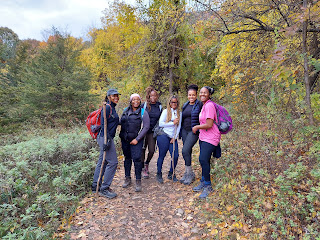8 Lessons Learned from a Recent Fox Encounter
 |
| Photo Credit: Steven J. Roth |
This was the scene during last weekend's weekend beach bonfire at Island Beach State Park, where nature had a delightful surprise in store for us. Amidst the laughter and warmth of our bonfire, we had the pleasure of sharing our sandy haven with some unexpected guests that decided to make several appearances, serving as a gentle reminder that we were sharing our beachside sanctuary with these enchanting creatures.
Now, I'm not going to lie to you...it did cause a bit of a stir at first because who knew foxes and beaches were a thing? I surely did not, but here are the lessons we took away from our interactions with these enchanting creatures:
Lesson #1 is more of a reminder that while foxes definitely fall under the category of wild animals, contrary to common misconceptions, they are inherently shy and non-aggressive animals and not predators of humans.
Lesson #2: Despite their docility, foxes are still wild animals, so observe them respectfully by maintaining a respectable distance and not approaching them. I honestly broke this rule in an attempt to get the mother on camera, but that was for science. If ever I have the pleasure of crossing paths with a fox in the future, consider this a lesson learned!
Lesson #3: As with all wildlife, resist the temptation to offer them food. For one, doing so is just going to ensure they keep coming back for more, but even worse, human food can be harmful to their health and disrupt their natural behavior.
Lesson #4 is that sudden movements or loud noises can startle foxes, so it's best to maintain a serene and quiet presence to avoid causing undue stress. We did not do this upon first learning we had company, but once we got our backup fires going, it was smooth sailing.
Lesson #5 is a reminder that you are in THEIR domicile, so respect their habitat the same way you'd want someone to come into your home and respect yours. The easiest way to do this is to avoid disturbing them if you stumble upon their dens, especially if there are kits (young foxes) present.
Lesson #6 is LEAVE NO TRACE and properly secure and dispose of your trash to prevent attracting wildlife to your area.
Lesson #7 is relevant because we noticed that one of the babies looked a little mangy, so when we got home, I looked up what, if anything, we should do with this information. The answer was to REPORT IT to the local wildlife authorities or animal rescue organizations for assistance, so that's what we did.
I hope they were able to find and save that little guy.
Lesson # 8 was learned during my call to animal rescue when they asked if we had dogs with us, and that is, If you encounter a fox and have pets with you, ensure they are on a leash and well-controlled to prevent unwanted interactions.
Our beach bonfire with Island Beach State Park's foxes added an unforgettable dimension to our night by the ocean. Remember, encounters with wildlife should always be handled with respect, care, and a commitment to preserving their natural behaviors. So, if you find yourself in a similar situation, follow these guidelines to ensure a safe and enjoyable experience for both you and the foxes who share our beautiful natural world.
.png)


My first time seeing foxes up close. Although I was nervous at first, my fears dissipated with the jokes and the ring of fire attempts 😄
ReplyDeleteLoved " it was for science". I learned a lot reading this article...thanks.
ReplyDelete